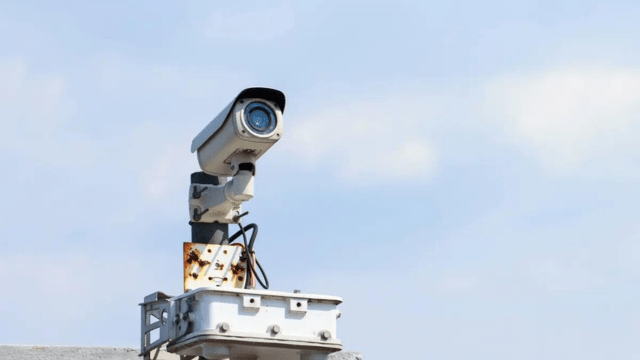
Photo: Olga Aniven/shutterstock.com
In the 75 years since its publication, 1984 has left a lingering mark on our world – well beyond the year it was fictionally set in.
The novel’s representation of people being watched by an all-seeing totalitarian leader has entered the everyday imagination, language, and even inspired the reality TV show, Big Brother. Its vernacular is now commonplace. Politicians of every persuasion describe any measure they are opposed to as Orwellian, a namesake for the novel’s author, George Orwell.
Dr Tyne Daile Sumner is an Australian Research Council DECRA Fellow in English and Digital Humanities at The Australian National University. She is currently working on SurveiLit, a project exploring how art and literature are responding to new and emerging forms of global surveillance.
“1984 specifically, and novels similar to it, have even more relevance now than they’ve ever had,” Sumner says.
“There’s a very good reason why Orwell’s novel experienced a complete surge in sales in 2016, when Donald Trump was elected US president.”
During Trump’s presidency, concepts such as ‘doublethink’ and ‘newspeak’ – which is “in a sense, fake news”, according to Sumner – became particularly relevant to our ‘post-truth’ world.
“What we experienced was a perfect storm of social media, particularly with platforms like Twitter, alongside a totalitarian, double speaking president. With that, we also saw the proliferation of new forms of home surveillance and various other means of tracking via phones and datafication,” Sumner says.
“Basically, 75 years after the novel’s release, all of Orwell’s concepts come full circle, but they do so through new forms of voluntary disclosure, digital content creation and datafied surveillance.”
The new surveillance normal
Still, for Sumner, 1984 represents a pre-internet understanding of surveillance – a uni-directional gaze, observing from a distance and often framed as between a citizen and the state. The turn of the 21st century and the arrival of ‘big data’ irrevocably changed that.
Surveillance is now more ubiquitous than when Orwell’s novel was first circulating. It encompasses the CCTV cameras monitoring our public places, the data collated about us and sold to advertisers through our actions online, everything we openly choose to share on social media, and the workplace surveillance that measures our activity on company-supplied devices.
Orwell couldn’t have predicted the way Big Brother would become a tool not only for government, but also for companies to gain information about who you are, your unique preferences, and how to market products and information to you.
“One of the ways that novelists, in particular, pick up on this change in the nature of surveillance is to morph and transfigure it into something that’s no longer just visual, but diffused, affective, and strangely everywhere: overhearing, biometric tracking, participatory surveillance through social media and other apps, different kinds of distributed and less traceable forms of surveillance,” Sumner says.
In her study, she points to Little Eyes by the Argentine author, Samantha Schweblin as an example of a novel that captures this new, multifaceted and participatory form of surveillance.
Translated into English in 2020, the novel charts the stories of 10 characters living in different parts of the world – from Germany to Senegal – after they purchase a home surveillance device called a kentuki. Kentukis are designed to look like a cute pet that follows their owner around but is operated remotely by someone else, somewhere else in the world.
“Schweblin’s novel breaks with the idea you might get from Orwell or Aldous Huxley with a single narrative figure, someone, somewhere specific being watched,” Sumner says.
“What you experience in this novel is instead, essentially 20 different interlaced perspectives – 10 watchers and 10 watched – all intimately connecting with each other.”
What about 2084?
As new technologies develop and surveillance changes, will 1984 lose its grip on our imaginations?
Sumner predicts that, like in 2016 when the novel had a sales boom, another boost in interest is on the way.
“What we have experienced since ChatGPT was first released to the public, which is intensifying week after week currently, is an entire rethinking of both image and text as we encounter them out in the world” she says.
Having to interrogate whether the information we receive comes from a human or an AI raises pressing questions about authenticity, sincerity and the value of human-generated language.
But even with gargantuan volumes of text being both surveilled and subsumed into AI-driven Large Language Models, Sumner argues that the representational, cognitive, and social function of literature is unlikely to change.
“Because of the intensification of AI-generated material and because people want this form of escapism from the everyday realities of being continually connected and monitored, the novel as a way to reflect and think critically and expansively, is still more important than ever.
“These stories, surveillance literature in a sense, are very much alive and about to take on a completely new and important role to helping people understand where we’re heading.”
This article was originally published onANU Reporter.